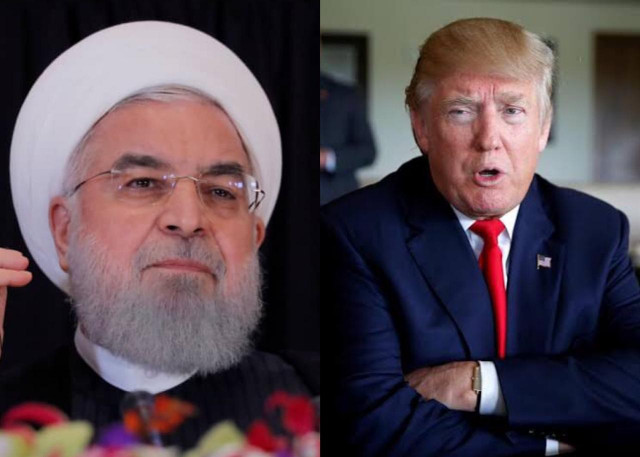Navigating a dangerous conflict
In Iran there would be resurgence and an urge for revenge

Iranian President Hassan Rouhani and US President Donald Trump. PHOTOS: REUTERS
Pakistan presently is so obligated financially and strategically to Saudi Arabia and the UAE that it cannot take a position that is at variance with theirs. Its weak economy and political instability prevents it from taking any role other than making conciliatory statements.
Other considerations of geography, Iran’s importance in the region and as a predominantly Shia country demand Pakistan seek good neighbourly relations with it. But, the Arab-Iran differences, Iran’s leanings toward India and its interests in Afghanistan are not always in congruence with Pakistan, inserting complexity to the relationship. The development of the Chabahar seaport with Indian assistance and strong economic and political ties between the two countries is viewed with suspicion although reservations remain muted. Until recently the Pakistan–Iran border had been a cause of considerable friction with each side blaming the other for cross border violations.
Foreign Minister Qureshi’s speech before the Senate laid bare Pakistan’s concerns. The conflict would further destabilise the region; push the Afghanistan peace process in the background and Yemen will become more anarchic. Oil flow could experience stoppages and Iran could back out of the nuclear deal. These are genuine concerns and surprisingly were overlooked by President Trump and his hard line Vice-President and Secretary of State.
Ever since President Trump took office he has taken several escalatory steps to build pressure on Iran. The most significant was the unilateral withdrawal from the Joint Comprehensive Plan of Action (JCPOA) also known as the Iran nuclear deal. He revoked the deal in May 2018. In 2015, Iran agreed to a long-term deal on its nuclear programme with major world powers, the P5+1 — the US, UK, France, China, Russia and Germany. This nuclear agreement had come about after years of painstaking deliberations by major powers and Iran. This was no ordinary achievement as Iran was made to roll back its programme to which it was in full compliance. The worst aspect of it was that by withdrawing from the nuclear deal, the US has created a dangerous vacuum that could take an undetermined course. Iran as a retaliatory measure could back out of the nuclear deal.
By withdrawing from the JCPOA, the US had already raised tensions and placed the remaining signatories in a dilemma. President Trump’s withdrawal has however been in total sync with Israel’s policy towards Iran. It has also pleased most of the Arab countries especially Saudi Arabia that have always looked upon Iran’s nuclear programme with great suspicion and a challenge to their security.
Fearing that as a response to the assassination of Gen Qasem Soleimani Iran may retaliate by withdrawing from the nuclear deal France, Germany and China are calling upon it to avoid any measures that would violate the agreement. Iran has already announced that it will abandon the limitations on enrichment while continuing to cooperate with the UN overseeing body. It was a cautious move as a full withdrawal could lead to US strikes and losing support of the P-4, further fueling the crisis. There is, however, every possibility that Iran would undertake retaliatory strikes at an opportune time as the head of Russia’s foreign affairs committee of parliament’s upper house remarked. The most probable targets would be the Saudi oil fields.
The US has taken a rash and unusual decision judging by its own past of targeting an individual commander. The chances of a dangerous escalation are very much present. More so as many countries in addition to the US are pitched against Iran. Israel foremost, and Saudi Arabia in particular. President Trump is also eyeing to win the support of the Jewish lobby in the forthcoming presidential elections by this move.
For Iran these are testing times. It is essentially standing up to the external pressure by mobilising patriotic fervour. Since the last year and a half there have been reports of anti-government demonstrations throughout the country due to a faltering economy and rising prices. But the US attack has galvanised the nation to bear sacrifices and prepare for martyrdom. Iran’s Supreme Leader has been successful in mobilising the people’s power. In several cities across Iran chest-beating men and women are seen taking to the streets mourning Gen Soleimani’s murder. President Hasan Rouhani, known generally for his moderate views, has tweeted that the people of Iran will take revenge for this dastardly attack.
The other consequence has been that anti-government movements in Iran and even in Iraq have subsided. The influence of Iran on Iraq’s politics is a major source of anguish for the US and its Middle Eastern allies. Iran has always tried to win over Iraq’s Shia leadership to its side while the Arab countries and US has supported the Sunni leadership that is more independent with leanings towards the West.
It would be unrealistic to assume that the Iran’s Islamic Revolutionary Guards would be weakened after the assassination of Gen Soleimani. Undoubtedly, the General enjoyed a reputation larger than life. He had charisma and reputation that has more of a symbolic than a substantive value. Ideology and organisational affiliations are more important.
In Iran there would be resurgence and an urge for revenge. Given the enormous risk and dangers involved, both America and Iran should step back and show utmost restraint.
Published in The Express Tribune, January 8th, 2020.
Like Opinion & Editorial on Facebook, follow @ETOpEd on Twitter to receive all updates on all our daily pieces.















COMMENTS
Comments are moderated and generally will be posted if they are on-topic and not abusive.
For more information, please see our Comments FAQ